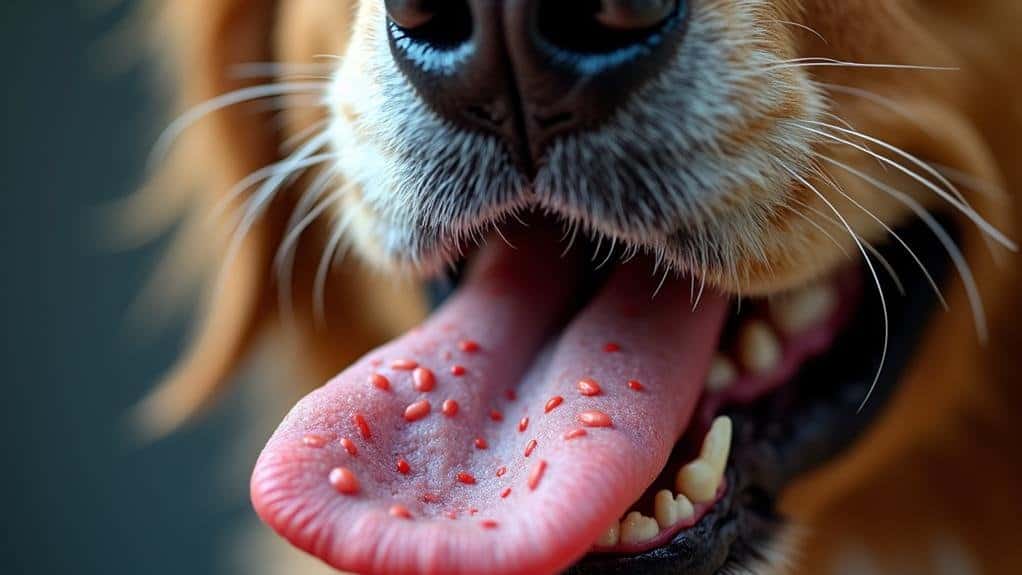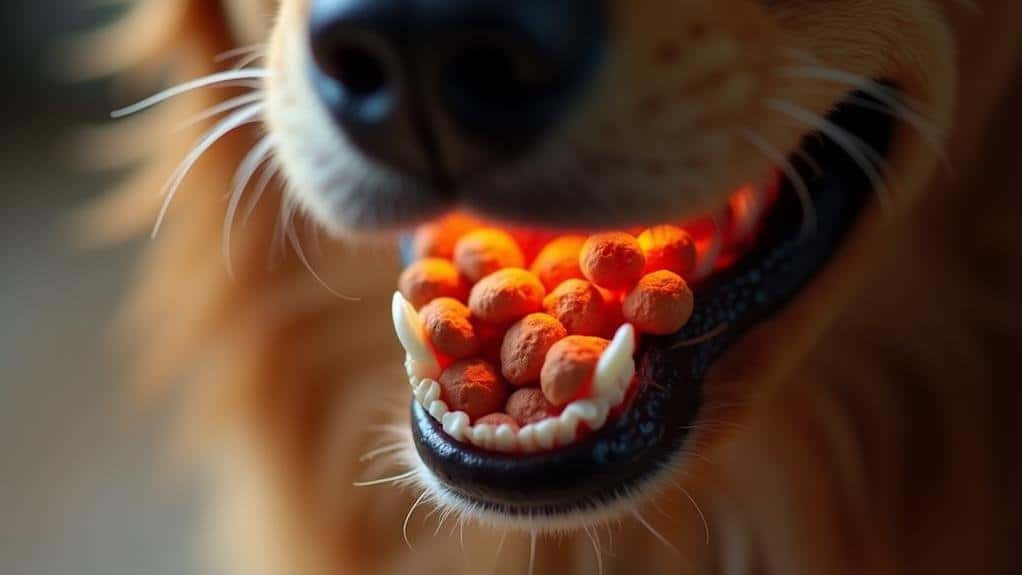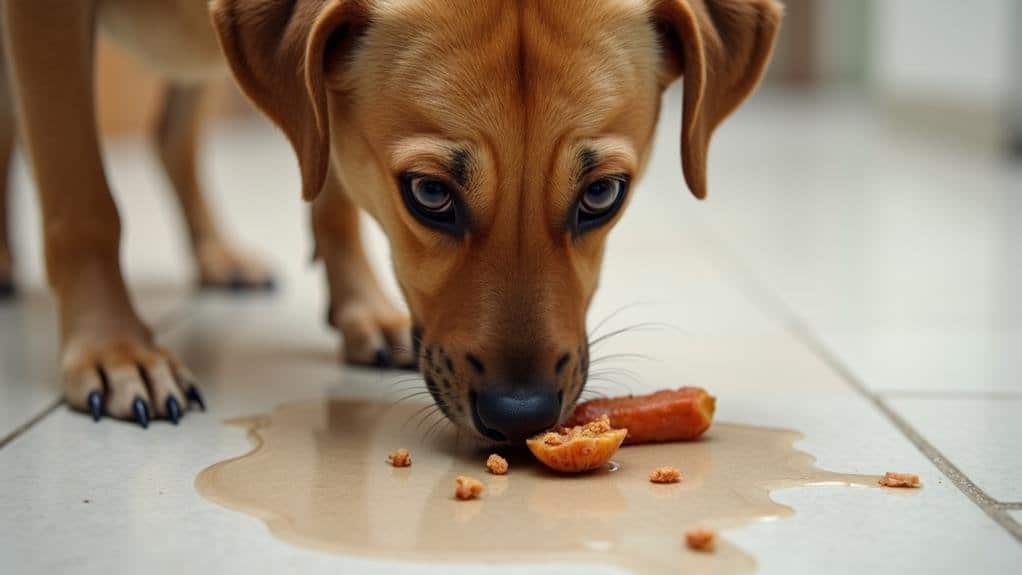Dogs eat their throw up due to instinctive behavior rooted in their wild ancestors' survival tactics. Their limited taste perception and strong reliance on smell make vomit less repulsive to them. This behavior also stems from puppyhood, where they learn to eat regurgitated food from their mothers. While gross to us, it's a normal canine behavior linked to scavenging instincts and nutritional needs. However, frequent vomiting or consuming vomit may indicate underlying health issues. Understanding the reasons behind this behavior can help you better manage and respond to your dog's actions.
Evolutionary Origins of Vomit Eating

Three key factors contribute to dogs' peculiar habit of eating their own vomit.
First, this behavior can be traced back to their evolutionary ancestors, who relied on scavenging for survival in the wild. By consuming their own vomit, dogs' ancestors could avoid starvation and eliminate evidence of illness that might attract predators.
Second, the practice of eating regurgitated food begins early in a dog's life. Around 3-4 weeks old, puppies learn to eat food regurgitated by their mothers. This natural feeding technique allows mother dogs to provide easily digestible nourishment to their young during the weaning process, establishing a habit rooted in survival instincts.
Lastly, dogs' limited taste sensitivity plays a role in this behavior. With only about 1/6 of the taste buds humans have, dogs may find vomit less unappealing than we do. This reduced sensitivity reinforces their instinctual behavior of eating regurgitated food.
Understanding these evolutionary origins helps explain why dogs engage in this seemingly gross behavior. It's a deeply ingrained survival mechanism that has persisted despite domestication.
Canine Taste Perception

While evolutionary origins explain why dogs eat vomit, their unique taste perception plays a notable role in this behavior.
You might be surprised to learn that your furry friend's sense of taste is notably less developed than yours. Dogs have only about one-sixth the number of taste buds that humans do, which greatly reduces their ability to discern flavors.
This limited canine taste perception means that dogs don't find vomit as repulsive as you do. In fact, they may not even recognize it as something unpleasant. Instead, dogs rely heavily on their powerful sense of smell to guide their eating habits. When they encounter vomit, they're more likely to be attracted to its familiar scent rather than deterred by its taste.
Furthermore, dogs' inability to distinguish between fresh food and regurgitated matter contributes to their tendency to eat vomit. Their natural instincts drive them to seek out nutrients, even from partially digested food.
Nutritional Aspects of Regurgitation

From a nutritional standpoint, regurgitated food can still hold value for dogs. When your canine companion throws up, you might notice undigested food in the vomit. This partially processed meal can retain much of its nutritional content, making it an appealing source of nourishment for your dog.
Dogs are instinctively driven to maintain adequate nutrient intake. If your pet is experiencing nutritional deficiencies, they may be more inclined to consume their vomit to reclaim lost nutrients. This behavior stems from their evolutionary past, where maximizing food intake was essential for survival.
The habit of eating regurgitated food often begins in puppyhood. Mother dogs regurgitate partially digested meals for their pups, teaching them that this is a valuable food source. This early learning experience can influence adult dogs to view vomit as a familiar and acceptable form of nourishment.
Your dog's limited taste perception also plays a role. With fewer taste buds than humans, dogs find vomit less repulsive and more palatable. The familiar scents and tastes in regurgitated food can provide comfort and reinforce the behavior as a way to fulfill nutritional needs.
Health Risks and Considerations

Despite the potential nutritional value of regurgitated food, allowing your dog to consume vomit comes with significant health risks. When your pet engages in this behavior, they may ingest harmful toxins, foreign objects, or pathogens that can lead to gastrointestinal issues or infections.
The high acid content in vomit can also damage your dog's tooth enamel and esophagus, potentially causing long-term dental problems if ingested repeatedly.
Regularly eating vomit might indicate underlying health concerns, such as nutritional deficiencies or gastrointestinal disorders, that require veterinary attention. Your dog may also be at risk of choking or experiencing gastrointestinal obstructions, especially if the vomit contains large or indigestible materials.
To minimize these risks, it's important to monitor and manage your dog's diet. By doing so, you can reduce the frequency of vomiting and regurgitation, thereby limiting your pet's exposure to the associated health hazards.
If you notice your dog consistently eating their throw up or exhibiting frequent vomiting and regurgitation, consult your veterinarian to address any potential underlying health issues and develop an appropriate management plan.
Distinguishing Vomiting From Regurgitation

Dog owners often struggle to differentiate between vomiting and regurgitation, but understanding this distinction is essential for your pet's health.
Vomiting involves active heaving and expulsion of stomach contents, including digested food and bile. It's characterized by abdominal muscle contractions and diaphragm involvement. The expelled material is typically acidic and may have a yellowish tint due to bile.
Regurgitation, on the other hand, is a passive process where undigested food is expelled from the esophagus shortly after eating. It requires minimal effort and doesn't involve muscle contractions. The regurgitated food appears undigested and is often covered in mucus.
While occasional regurgitation may not be cause for concern, persistent vomiting or regurgitation can indicate underlying health issues. By recognizing the differences between these two processes, you'll be better equipped to identify potential problems and seek appropriate veterinary care when necessary.
Pay attention to the frequency, appearance, and circumstances surrounding your dog's expulsions. If you're unsure whether your pet is vomiting or regurgitating, or if the behavior persists, consult your veterinarian for a proper diagnosis and treatment plan.
Training Dogs to Avoid Vomit

While understanding the difference between vomiting and regurgitation is important, it's equally valuable to know how to train your dog to avoid vomit altogether.
Training dogs to avoid vomit requires consistent effort and positive reinforcement. Start by teaching verbal commands like "leave it" to redirect your dog's attention when they approach vomit. Reinforce this command during regular training sessions, rewarding your dog with treats or praise when they successfully ignore the substance.
Focus on developing your dog's impulse control through structured training exercises. This will help them prioritize your commands over their scavenging instincts.
Supervise your dog closely during mealtimes and clean up any vomit immediately to minimize opportunities for unwanted behavior.
If your dog exhibits resource guarding or aggressive tendencies during cleanup, consider consulting a professional dog trainer or behaviorist. They can provide specialized guidance to address these more complex issues.
When to Consult a Veterinarian

Pet owners often struggle to determine when their dog's vomiting behavior warrants professional attention. If you notice frequent vomiting or regurgitation in your dog, especially when accompanied by lethargy or loss of appetite, it's vital to seek veterinary care immediately. These symptoms could indicate underlying medical issues that require professional assessment.
When your dog consistently eats its vomit, it may signal nutritional imbalances or other health concerns. It's important to observe your pet for distress signals after consuming vomit, such as unusual behavior or gastrointestinal upset. If you notice any of these signs, don't hesitate to consult a veterinarian.
You should seek urgent veterinary attention if:
- Your dog experiences persistent vomiting episodes
- The vomit contains blood or bile
- Your pet shows signs of severe distress or pain
- There's a sudden change in your dog's eating habits or behavior
Regular check-ups are recommended for dogs with frequent vomiting to monitor for gastrointestinal or dietary issues.
Frequently Asked Questions
Do Dogs Understand When You Throw Up?
No, your dog doesn't understand when you throw up. They're drawn to the smell and may see it as food. While they can't grasp the concept of illness, they might respond to your distress or behavior changes.
Why Do Dogs Look Guilty When They Throw Up?
Your dog's guilty look after throwing up isn't true guilt. It's a response to your reaction. They've learned to associate vomiting with your displeasure, so they show submissive behavior to avoid potential conflict or punishment.
What Happens if a Dog Eats Human Vomit?
If your dog eats human vomit, they might experience stomach upset or illness. They could be exposed to harmful substances or pathogens. Watch for signs of distress and contact your vet if you're concerned. It's best to prevent this behavior.
Do Dogs Feel Bad When They Vomit?
Your dog likely doesn't feel bad when vomiting. They don't experience guilt or shame like humans do. Instead, they're driven by instinct and may even eat their vomit to eliminate evidence of illness in the wild.
Conclusion
You've now gained insight into why dogs eat their own vomit. It's a behavior rooted in evolution and instinct, not just gross habits. Remember, it's usually harmless, but you should monitor your pup's health. If you're concerned, don't hesitate to consult your vet. With patience and training, you can discourage this behavior. Understanding your dog's natural instincts will help you be a better, more empathetic pet owner.

